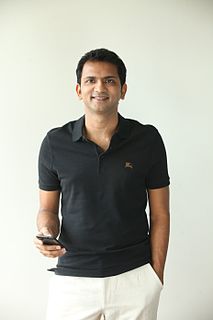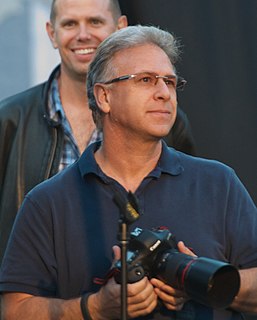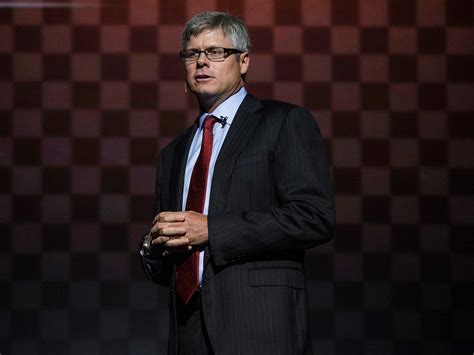Top 121 Smartphones Quotes & Sayings - Page 2
Explore popular Smartphones quotes.
Last updated on November 23, 2024.
Computers and computing are all around us. Some computing is highly visible, like your laptop. But this is only part of a computing iceberg. A lot more lies hidden below the surface. We don't see and usually don't think about the computers inside appliances, cars, airplanes, cameras, smartphones, GPS navigators and games.
I would say the first key concept is that, in terms of technological and communication progress in human history, the Internet is basically the equivalent of electronic telepathy. We can now communicate all the time through our little magic smartphones with people who are anywhere, all the time, constantly learning what they're thinking, talking about, exchanging messages. And this is a new capability even within the context of the Internet.
How did we kill time before smartphones? I honestly can't recall. I have a vague recollection of flipping through magazines in waiting-room-type situations, but what did we do, say, in line at the post office? Waiting for a bus? Waiting for someone to meet us at a restaurant? I mean, did we just look around or something?
A lot has changed in India in the last decade. We can attribute the growth of India's startup ecosystem to the increased penetration of affordable smartphones and data connectivity across the country. Technology is no longer a luxury. People across generation and geographies are making use of mobile technologies. Startups have capitalised on this phenomenon.
The difference between smartphones and cigarettes is this: a cigarette robs 10 minutes from your lifespan, but at least has the decency to wait and withdraw all that time in bulk as you near the end of your life - whereas a smartphone steals your time in the present moment, by degrees. Five minutes here. Five minutes there. Then you look up and you're 85 years old.
In the developing world, they don't have smartphones yet. They have the older plastic phones, but women are saving money on those, because they don't have access to banks. Having that access to digital money changes everything for her because she actually doesn't have to negotiate with her husband, which she will tell you is very hard in these circumstances, especially when the means are meager. She's expected to have money to pay for the kids' health or to help with the school fees.
Microsoft Mobile Oy is a legal construct that was created to facilitate the merger. It is not a brand that will be seen by consumers. The Nokia brand is available to Microsoft to use for its mobile phones products for a period of time, but Nokia as a brand will not be used for long going forward for smartphones. Work is underway to select the go forward smartphone brand.
If you look at the first generation of wireless, it really lasted about 15 years before we went to the second generation. When we implemented the fourth generation, which allowed us to do all the smartphones and the videos, the time between that and going to the fifth generation is going to be four years.
Kids absolutely not reading. I think it's because they're so screen-oriented [TVs, computers, smartphones]. They do read - girls in particular read a lot. They have a tendency to go toward the paranormal, romances, Twilight and stuff like that. And then it starts to taper off because other things take precedence, like the Kardashian sisters.
I don't foresee a future where people don't have some sort of phone that's like a computer. I don't foresee a future where those phones don't have cameras in them. That spells a future where smartphones are the status quo. You have to ask yourself how you allow people to communicate what's in their lives.
Even though you can't get along without your smartphone, there are not many essential services on your smartphone. They're mostly convenience; you could live without it. Essential means you die without it. A gadget that warns you're about to have a heart attack - that's essential. We're about to go into that phase with smartphones.
Although prison officials have long battled illegal cellphones, smartphones have changed the game. With Internet access, a prisoner can call up phone directories, maps and photographs for criminal purposes, corrections officials and prison security experts say. Gang violence and drug trafficking, they say, are increasingly being orchestrated online, allowing inmates to keep up criminal behavior even as they serve time.
Technology is something you have to embrace because technology is part of our generation. Digital natives, for instance, are people who grew up in a world that always had the Internet and who always had smartphones. Millennials aren't too far behind: my generation of people, who were in the mix of the Internet when it first came out.
As smartphones have allowed us to have our computers, emails, social media feeds, and a full surveillance system in our pockets at all times, stories of the law enforcement's unease with that have been popping up in the press. And of course, the ones that become viral videos aren't exactly flattering for law enforcement.
If you cannot make moving pictures about yourself, your country and your culture, it's as if you do not exist anymore in this world of images we live in. Because now when we all switch on our smartphones or our iPads or our computers, it's all image and sound. All people and cultures must work to secure their place in the digital space. Cinema is also political in this way.
When I see an old movie, like from the ’40s or ’50s or ’60s, the people look so calm. They don’t have smartphones, they’re not looking at computer screens, they’re taking their time. They’ll sit in a chair and just stare off into space. I think some day we’ll find our way back to that garden of Eden.
Most people would say they live with an internal angst that they can't always put their finger on. This is because the Internet has changed our very way of being in this world, compelling us to be perpetually "on" - from our cars to our computers, our tablets to our smartphones, our desks to our living rooms or dining tables, our churches to our libraries to our schools.
And by banning [smartphones] from the set, the whole crew tends to work tighter with each other. And then it just becomes a thing where people kind of fall in love with the idea, 'This is the film-industry that I signed up for! This is really wonderful.' But then they go back to another set and everybody's on their cellphone, everyone's in their own little box, and they get depressed about it.
Cloud computing, smartphones, social media platforms, and Internet of Things devices have already transformed how we communicate, work, shop, and socialize. These technologies gather unprecedented data streams leading to formidable challenges around privacy, profiling, manipulation, and personal safety.
IQ is a commodity, data is a commodity. I'm far more interested in watching people interact at a restaurant with their smartphone. We can all read 'Tech Crunch,' 'Ad Age.' I would rather be living in the trenches. I would rather be going to Whole Foods in Columbus Circle to watch people shop with their smartphones.

























































